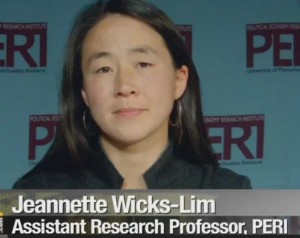Want a Better Job? Degrees Won’t Help You, But Organizing Will

UMass professor Jeannette Wicks-Lim has written a paper called “The Working Poor: A Booming Demographic,” and spoke with Paul Jay of the Real News Network about the future workers of America. Three major points:
1. The jobs expected to add the most numberof jobs over the next ten years — 2/3 of all new jobs — are low-wage jobs. “I think what we’ve been seeing in the recent decades is a large growth in jobs that pay very low wages, and then some growth in jobs that pay very high wages, and those sort of middle-income jobs that pay decent wages, [for example] the auto manufacturing jobs, their pay is either decreasing, or their jobs are going overseas.”
2. It’s already happening. It used to be that 25% of workers who were in low-paying jobs had college experience, according to Wicks-Lim. Now it’s 40%. These low-paying jobs do not require a college degree, and having one isn’t necessarily be an asset at all — it’ll mean entering the labor force later, having less experience, and in many cases, having school debt.
3. It can get better. Childcare, home healthcare, and other service jobs “are jobs that need to be done by people within the U.S. border … so these jobs actually have the potential to be improved because they can’t be easily replaced with machines. So these are jobs that have potential to become better-quality jobs. But … what I argue in the piece is you need a stronger labor movement.”
Video and transcript of the interview available here, and Wicks-Lim’s full paper is available here.
Support The Billfold
The Billfold continues to exist thanks to support from our readers. Help us continue to do our work by making a monthly pledge on Patreon or a one-time-only contribution through PayPal.
Comments